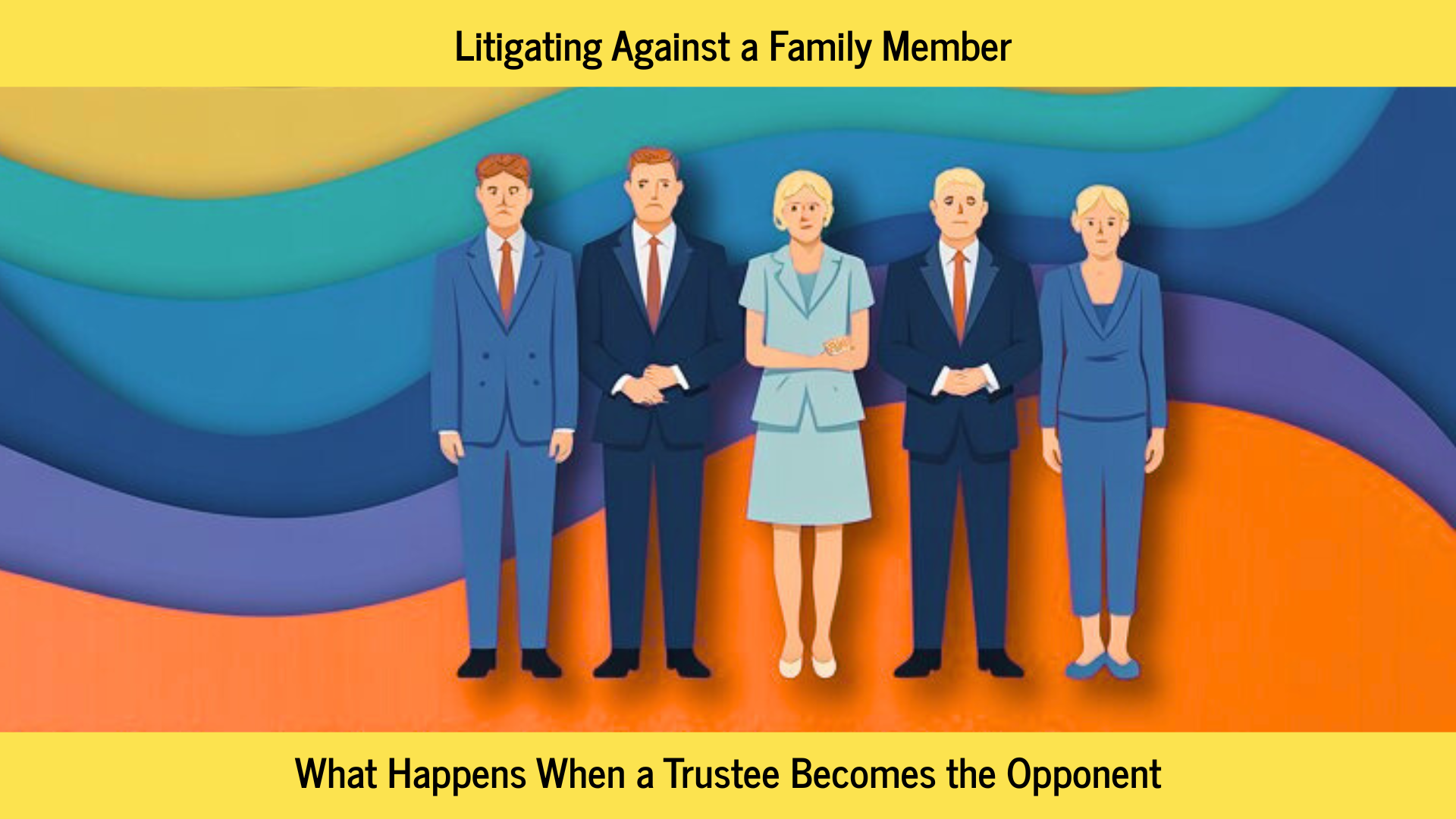
What Happens When a Trustee Becomes the Opponent: Litigating Against a Family Member
Inheritance can bring out the best and the worst in families. Trusts are designed to create clarity and avoid conflict. But what happens when the very person appointed to ensure fairness and transparency—a trustee—becomes the source of dispute due to a trustee breach of fiduciary duty? What if that trustee is your brother, your daughter, your uncle, or another family member?
Litigating against a family trustee for a trustee breach of fiduciary duty is one of the most emotionally complex and legally challenging paths in probate law. It’s not just about legal rights and fiduciary breaches; it’s about history, betrayal, trust, and heartbreak. This guide will take you through everything you need to know: what to expect, how to prepare, and how to protect your interests without sacrificing your dignity or peace of mind.
I. When Trust Is Broken: Understanding the Role of the Trustee
Before diving into litigation, it’s crucial to understand what a trustee is legally obligated to do—and how these obligations are often breached.
A. The Legal Duties of a Trustee
Trustees are fiduciaries. That means they have the highest legal duty to act in the best interest of the trust’s beneficiaries. Their primary responsibilities include:
- Administering the trust according to its terms
- Acting impartially between multiple beneficiaries
- Avoiding self-dealing or conflicts of interest
- Keeping beneficiaries informed
- Managing assets prudently and providing accountings
When a trustee deviates from these duties—through negligence, concealment, favoritism, or fraud—they can be held legally accountable.
B. When the Trustee Is Family
Family trustees are common, especially in revocable living trusts where a parent names an adult child or sibling as successor trustee. While the intention is to preserve family harmony, reality often tells a different story.
The most common sources of tension include:
- Perceived favoritism toward one beneficiary
- Lack of transparency in communication and finances
- Delays in asset distribution
- Disputes over interpretations of the trust document
- Outright misappropriation of assets
II. Recognizing the Warning Signs of Trouble
Litigating against a trustee usually doesn’t begin with a bang—it starts with small doubts. Over time, those doubts grow. Here are some red flags that your family trustee may be acting improperly:
A. Delay and Deflection
You ask for an accounting. Weeks pass—then months. You get vague answers like, “I’m still working on it,” or “Just trust me.” Trustees are legally required to keep beneficiaries informed. Chronic delays are a sign of trouble.
B. Secretive Behavior
The trustee won’t share documents. They avoid meetings. They communicate only through selective emails or texts. A good trustee should welcome transparency.
C. Preferential Treatment
You hear that your sibling (also a beneficiary) got an early distribution or moved into a trust property without permission. Unequal treatment may breach the trustee’s duty of impartiality.
D. Resistance to Oversight
When pressed, the trustee becomes defensive or hostile. They accuse you of being greedy or disrespectful. If they refuse to open the books, you may need the court’s help to do it for them.
III. Emotional Terrain: Why Family Litigation Feels Different
Litigating against a trustee is hard. Litigating against a family trustee is harder. It’s not just a legal battle—it’s an emotional gauntlet.
A. The Guilt Trap
Many beneficiaries feel torn: “Do I really want to sue my own sister?” Trustees often weaponize this guilt, painting litigation as betrayal rather than accountability.
B. Family Pressure
Other family members may take sides—or beg you to drop the case “for the sake of peace.” But peace without justice is merely silence.
C. Psychological Warfare
Family trustees may gaslight, intimidate, or manipulate. They may twist facts or exploit old wounds. Recognizing these tactics is key to maintaining clarity and confidence.
IV. What to Expect in a Family Trustee Lawsuit
If you choose to move forward with litigation, knowing what lies ahead can reduce fear and increase focus. Here’s what the typical process looks like:
A. Pre-Litigation
- Document Requests: Your attorney may first try to request records or accountings informally.
- Demand Letters: A formal letter from your attorney may outline the trustee’s breaches and request resolution without court involvement.
- Mediation Attempts: In some cases, early mediation may be suggested before filing.
If these efforts fail, your attorney may recommend initiating litigation.
B. Filing a Petition in Probate Court
Litigation begins with a court petition. Common grounds for petition include:
- Breach of fiduciary duty
- Failure to provide an accounting
- Self-dealing or embezzlement
- Removal of the trustee
- Surcharge (damages for loss or misuse of trust assets)
C. Discovery Phase
This is where evidence is gathered. You may obtain:
- Bank statements and ledgers
- Communications between the trustee and others
- Real estate records
- Internal trust documents
- Witness depositions
Discovery is often where the truth emerges—and where settlement discussions become more serious.
D. Motions and Hearings
Before trial, there may be hearings on motions (e.g., to compel production of documents or dismiss certain claims). These are important turning points.
E. Trial
If the case isn’t resolved in mediation or settlement, it proceeds to trial. You and your attorney will present your case, witnesses will testify, and the judge will make a ruling. Some cases may involve a jury, but most trust disputes are bench trials (judge only).
F. Post-Trial
Even after judgment, additional steps may be needed to enforce the court’s decision, remove the trustee, or recover damages.
V. Building a Strong Case: Evidence Is Everything
No matter how morally outraged you are, courts rely on evidence—not emotion. Here’s what you need to build a compelling case.
A. The Trust Document
This is your roadmap. It outlines the trustee’s powers and duties. Any deviation from its terms is potential grounds for breach.
B. Financial Records
Request copies of:
- Trust bank accounts
- Investment portfolios
- Property management records
- Tax returns
Patterns of mismanagement often emerge here.
C. Communications
Emails, text messages, and voicemails between the trustee and other beneficiaries can reveal intent, evasion, or favoritism.
D. Witnesses
Neutral third parties (e.g., accountants, caregivers, neighbors) may corroborate your claims. Even other beneficiaries may support your position if they’ve been similarly harmed.
VI. Psychological Preparation: Taking Care of You
This kind of litigation isn’t just hard on your wallet—it’s hard on your soul. Protecting your mental and emotional well-being is crucial.
A. Accept Emotional Complexity
You may feel rage, sorrow, fear, and doubt—all at once. That’s normal. Don’t suppress it. Acknowledge the grief that comes from family betrayal.
B. Seek Support
Talk to a therapist who understands family trauma and legal stress. Join online groups for people navigating inheritance disputes. Don’t isolate.
C. Prepare for Pushback
Be ready for smear campaigns, manipulation, or passive-aggressive tactics from your trustee—or their allies. Keep calm and document everything.
D. Trust Your Legal Team
A good attorney is more than a litigator—they’re your advocate, counselor, and strategist. Rely on their guidance to stay focused and grounded.
VII. Tactical Considerations: What Success Looks Like
Success in trust litigation doesn’t always mean “winning” in court. Sometimes, it means protecting your rights, restoring transparency, or removing a toxic trustee. Be open to different forms of resolution.
A. Trustee Removal
The most common goal in family trustee disputes. If a trustee is clearly conflicted, negligent, or abusive, courts can appoint a neutral third-party trustee.
B. Surcharge Awards
Courts may order trustees to personally repay the trust for lost or stolen funds. This sends a strong message that breach of duty has consequences.
C. Equalization of Distributions
If one beneficiary has received an unfair advantage, courts may order adjustments to restore balance.
D. Accountings and Oversight
Even if full removal isn’t ordered, courts may require formal accountings and ongoing supervision to prevent future abuse.
E. Settlement
Many cases settle before trial. A well-negotiated settlement can avoid years of courtroom battles, even if it means compromise. Know your bottom line—and stick to it.
VIII. Moving Forward: What Comes After the Battle
Winning in court is only one chapter in your story. What comes next is equally important: healing.
A. Family Fallout
Litigation may permanently damage relationships. You may be blamed, ostracized, or excluded. That’s painful—but not your fault. Seeking justice is not a betrayal.
B. Financial Recovery
Once assets are restored or re-distributed, consider your own estate plan. Protect future generations from going through what you did.
C. Emotional Recovery
Legal battles take a toll. Give yourself time to decompress, reflect, and grieve what was lost—not just money, but trust and connection.
D. Using Your Experience for Good
Many people emerge from trustee litigation with a deeper sense of purpose. They volunteer, advocate, or become better stewards of their own families. Your story might help someone else down the road.
Final Words
When a trustee becomes your opponent—especially a family member—you’re not just fighting over money. You’re fighting for fairness, for legacy, and for the voice of someone who trusted the system to work but may have suffered from a trustee breach of fiduciary duty.
These battles are not for the faint of heart. But they are winnable—with the right knowledge, legal support, and emotional resilience. At Hackard Law, we’ve stood beside hundreds of clients in their darkest inheritance disputes involving trustee breach of fiduciary duty. We’ve seen families break—and rebuild. We’ve helped restore justice when it seemed out of reach.
You don’t have to go through this alone. If you suspect a family trustee is abusing their power, know this: you have rights, you have options, and you have advocates ready to stand with you.
If you need help navigating a family trust dispute, Contact Us | Hackard Law | California Estate & Probate Litigation for a confidential consultation.

 (916) 775-8542
(916) 775-8542 